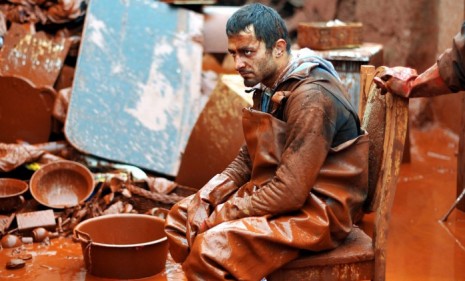Hungary's toxic sludge disaster
A collapse at an aluminum plant last week unleashed a deluge of deadly chemical waste — and things could get much worse

A free daily email with the biggest news stories of the day – and the best features from TheWeek.com
You are now subscribed
Your newsletter sign-up was successful
A wave of red sludge unleashed from an aluminium-processing plant has devastated the Hungarian countryside, killing seven people, injuring hundreds of others, and laying waste to a number of villages. An activist calls it "one of the top three environmental disasters in Europe in the last 20 or 30 years." Now, officials warn of a new sludge deluge. (Watch an ITN News report about the sludge.) What happened — and what's next?
What caused the spill?
The exact circumstances remain unclear, but the catalyzing incident was a wall failure at the Ajkai Timfoldgyar plant in Ajka, Hungary, which in a hilly area of Western Hungary. The wall was a barrier to a reservoir holding millions of tons of industrial waste — when it failed, it released 200 million gallons of toxic sludge that quickly swept into neighboring villages.
The Week
Escape your echo chamber. Get the facts behind the news, plus analysis from multiple perspectives.

Sign up for The Week's Free Newsletters
From our morning news briefing to a weekly Good News Newsletter, get the best of The Week delivered directly to your inbox.
From our morning news briefing to a weekly Good News Newsletter, get the best of The Week delivered directly to your inbox.
What are the effects so far?
The initial cascade of sludge killed seven people and injured hundreds, many of whom suffered burns from the caustic chemicals within. It "swept cars off roads and damaged bridges and houses," rendering at least one village uninhabitable and two others badly damaged. The toxic pollutant coursed into tributaries of the Danube, killing off all fish life in the small rivers it hit first and eventually reached the main waterway. Overall, the spill has damaged about 15 square miles of land area, and a sizeable portion of that terrain "will need a complete soil change."
What is the sludge, exactly?
It's a "by-product from the early stage of aluminium production." Roughly half of it is made up of iron oxide particles, which accounts for its color. But the exact composition of "red mud," as engineers call the sludge, "varies with the quality of the processing procedures it has undergone" — and in this case, "the exact chemical composition of the sludge has not been revealed."
A free daily email with the biggest news stories of the day – and the best features from TheWeek.com
How dangerous is the sludge?
Scientists say that, though the toxic material was deadly when it first leaked, it is much less so now — one expert comments: "It's not a 'we're all going to die' scenario. It's not like a big cyanide spill." Though the sludge was deadly to all life forms when it first spilled out of the plant, its toxicity levels — measured by an unnaturally high pH level — were diluted as it flowed into larger bodies of water. By the time the sludge reached the Danube River emergency crews could help temper pH levels by "pouring weak acidic items, such as vinegar and plaster into the river." The consensus is that a large-scale catastrophe has been averted.
Could the spill have been avoided?
Officials are looking into it. According to The New York Times, the site was "on a 2006 watch list of more than 150 industrial sites that were at risk for accidents that could contaminate the Danube River."
Is there a risk that more sludge will spill?
Yes. There are still a large quantity of waste remaining in the plant's reservoir and officials think the cracked containment wall may yet collapse entirely. The government is trying to stabilize the barrier and is also building an emergency containment dam. In the meantime, the nearby village of Kolontar has been evacuated completely in preparation for another onslaught.
Is anyone being punished for this?
On Monday, authorities arrested Zoltan Bakonyi, managing director of MAL Zrt, the company in charge of the burst reservoir. Bakonyi "will be charged with criminal negligence leading to a public catastrophe, and if convicted could face a sentence of up to 10 years." Hungary also announced it will enact a new emergency law enabling a government takeover of MAL, and "has ordered the checking of all similar companies and red-sludge ponds in the country" in an attempt to avoid future disasters.
Sources: New York Times, BBC, NPR, MSNBC, Wall Street Journal
-
 Political cartoons for February 16
Political cartoons for February 16Cartoons Monday’s political cartoons include President's Day, a valentine from the Epstein files, and more
-
 Regent Hong Kong: a tranquil haven with a prime waterfront spot
Regent Hong Kong: a tranquil haven with a prime waterfront spotThe Week Recommends The trendy hotel recently underwent an extensive two-year revamp
-
 The problem with diagnosing profound autism
The problem with diagnosing profound autismThe Explainer Experts are reconsidering the idea of autism as a spectrum, which could impact diagnoses and policy making for the condition